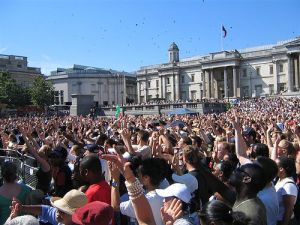// the reason we sing (part 5)
THE STORY SO FAR
So if this is all about God’s glory dwelling within us in order that He is eventually given glory by all people, then what exactly are we doing when we worship? Yesterday we were talking about the conditions for worship; what our worship should look and sound like, and how it should be structured…
Asking what, in short, is the reason we sing…
DAY FIVE
Except, as we well know, worship doesn’t just come down to singing. It can’t. And God’s glory doesn’t just show itself in our collective gatherings. That’s a visible fact. And if you look closely at the line that divides the reason we live and the reason we sing you realise that the two overlap and keep overlapping, blurring into each other whether you like it or not, until it eventually becomes clear that the two are, in fact, inseparable…
Because it turns out that the reason we live is the reason we sing, and vice-versa…
All of this comes down to God’s glory, and I’m neither the first person to notice that nor the first person who said it.
Which means, at the end of all of this, that our singing is just the outward expression of a life dedicated to giving glory to God.
That is to say (deep breath…)
If God’s glory dwells within us, and God’s glory is the emblem of His presence with His people…
And you are one of those people, who acknowledges their need for Christ’s sacrifice and seeks God’s glory…
Then God’s glory is going to be outworked in you. In you personally. In the passions that you have been given. In the way that you pray. In the way that your mind works, And in the way that you worship – whether that’s with organ or with acoustic guitar or with electric guitar or with DJ booth.
You are an integral feature in the glory of God. Not because He needs you, but because He chose you. He chose to have His glory dwell in you, and He made a way for that to happen, because you are important in all of this.
And in a strange way that brings us full circle; back to a woman sitting at a well talking about history and theology with Jesus himself.
A woman talking about a mountain, and a temple, and the glory of God.
“Sir… I can see that you are a prophet. Our ancestors worshipped on this mountain, but you Jews claim that the place where we must worship is in Jerusalem” (John 4:19-20).
Jesus’s answer? “Believe me, a time is coming when you will worship the Father neither on this mountain nor in Jerusalem… a time is coming and has now come when true worshippers will worship the Father in spirit and in truth, for they are the kind of worshippers that the Father seeks…” (v21, 23)
Worship just walked into that situation. Worship is implicit in this moment. And that’s the truth of worship, too, the truth of our lives; you just walk into these situations into which you have been called and you worship in the midst of them, you give glory back to God. Standing at that well is the same as standing on that mountain where we began all of this. It’s still an experience of the life-changing, awesomely powerful glory of God. That glory is still being declared for all the world to see. And this is still a meeting with God.
Because the glory of God is in the face of Jesus Christ. Right here.
Everything changed, even as nothing changed.
Jesus stands at a well and a woman’s life is changed; by the glory of God, and for the glory of God.
And he has called us to be like him, to do as he did. His glory dwells within us, and we’ve been given that gift, we’ve met that same figure, the risen Christ, in order that God will be brought glory in all of this world.
That means our Sunday gatherings become the final expression of what God has been doing in the week leading up to them. They’re places of involvement, where we are made aware of what God is doing and we are stirred towards engaging with it. They’re places for reflection, where we can look back on the past week, let God’s spirit stir our hearts and direct us to where it is that His glory needs to be seen. They’re places for celebration, where we can celebrate God’s glory with us, celebrate what He is doing and what He has done. But they’re not an endpoint in themselves, just a continuation…
To acknowledge that, that might mean more worship songs written into direct contexts – think of Bluetree’s “God of this City”, written among Thai sex districts, or David Crowder Band’s “Here is Our King”, a reaction to the Boxing Day Tsunami, or John Mark McMillan’s “How He Loves”, written in the aftermath of the death of a youth pastor. That may mean restructuring our gatherings so that they are not so self-contained, so consciously *complete*, but instead acknowledge that there is work to be done outside, and church is not the culmination of that work, but just the beginning…
The glory of God is in our midst. It is walking amongst a dying world and it is meeting women at wells and it is modelling God’s love, God’s nature and God’s character to the people it meets.
Or, at least, it should be…
***
But this is not the end of this discussion, because this discussion ends with you and God. If there are questions that you need to ask Him; like, ‘have I really sacrificed anything?’; like, ‘am I living a life for Your glory?’; like, ‘where are you calling me – where, or who, need to see You the most?’; then this is the time to ask those questions. The answers may not be instantaneous. This may be a process. But I assure you, the end point will be worth it.
I am not you, and I don’t know what your endpoint will be, or even what it will look like. We have to work this one out in community and with God, work out how this all works in practice, what bringing glory to God in our lives and in our worship looks like. But hopefully as a starting point (as that is what this is, and nothing more), this got you excited.
As I’ll tell you this: it got me excited. I can’t wait to hear what God is doing in you. I can’t wait to hear what comes next. I really can’t.
Something is coming, and it’s for His glory.
And I want to be a part of that, even though at the moment its conclusion is terrifyingly unknown.
What about you?
 If you’re still fortunate enough to get a summer holiday that lasts longer than about fourteen days (as i currently am, although probably for the last time ever), then you’ll doubtless know the experience of dissipation that accompanies the end of term – when your community separates and heads off back to the rest of the country, and you return home to a place that doesn’t entirely feel like home anymore. It’s a strange state of affairs, one that reminds you that what constitutes ‘home’ is frequently people rather than place, and that only serves to highlight just how dislocated you are apart from the community that you end up being a part of.
If you’re still fortunate enough to get a summer holiday that lasts longer than about fourteen days (as i currently am, although probably for the last time ever), then you’ll doubtless know the experience of dissipation that accompanies the end of term – when your community separates and heads off back to the rest of the country, and you return home to a place that doesn’t entirely feel like home anymore. It’s a strange state of affairs, one that reminds you that what constitutes ‘home’ is frequently people rather than place, and that only serves to highlight just how dislocated you are apart from the community that you end up being a part of. Sitting in my kitchen last night, having just got back from a week-long trip to Christian drug rehab charity Betel, my mother and I got talking about guilt – and specifically the culture of guilt that she grew up in. As a straightforward evangelical, she was brought up thinking in terms of ‘how many people saved’, ‘how much time spent praying’, ‘how much money given’, a standard that she was never able to measure up to – nobody could – and although God’s grace has softened that over time, those initial habits and ways of seeing are nonetheless hard to shake. We ended up talking about whether this was the best way of doing things, the best way of seeing things, and whether it was ever fair to call ourselves the ‘saved’ ones, especially given the mess that our church and its members are in. Many evangelicals have had this same conversation, and we find ways to beat the guilt, but all that seems to do it is the fact that we’re all apparently in the same boat…
Sitting in my kitchen last night, having just got back from a week-long trip to Christian drug rehab charity Betel, my mother and I got talking about guilt – and specifically the culture of guilt that she grew up in. As a straightforward evangelical, she was brought up thinking in terms of ‘how many people saved’, ‘how much time spent praying’, ‘how much money given’, a standard that she was never able to measure up to – nobody could – and although God’s grace has softened that over time, those initial habits and ways of seeing are nonetheless hard to shake. We ended up talking about whether this was the best way of doing things, the best way of seeing things, and whether it was ever fair to call ourselves the ‘saved’ ones, especially given the mess that our church and its members are in. Many evangelicals have had this same conversation, and we find ways to beat the guilt, but all that seems to do it is the fact that we’re all apparently in the same boat…